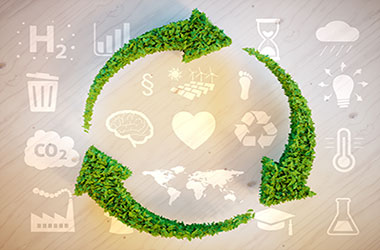
The Need for Sustainable Wastecycles
The global increase in industrialization and urbanization has resulted in an exponential growth of waste production. Improper disposal of waste has caused severe environmental damage, leading to climate change, pollution, and health problems. A sustainable approach to waste management is vital for the preservation of the planet’s ecosystem. The use of biodegradable materials is a crucial approach to achieving this goal. Hemp, a versatile plant, is gaining attention as an alternative to traditional materials that pollute the environment. In this article, we explore the potential of biodegradable hemp as a solution to replace polluting wastecycles.
The Promise of Biodegradable Hemp as a Solution
Hemp is a fast-growing plant that is easy to cultivate and harvest. It is a sustainable crop that requires a minimal amount of water and fertilizer, making it an environmentally friendly option. Hemp is biodegradable, which means it can decompose naturally, leaving no toxic residue. The durability of hemp fibers makes it an ideal alternative to synthetic materials, which take hundreds of years to decompose. Hemp is an excellent source of renewable energy and has numerous uses, making it a promising solution for replacing polluting wastecycles.
Advantages of Hemp over Traditional Materials
Hemp has several advantages over traditional materials, including its biodegradability, versatility, and durability. Hemp is a natural fiber that is free from synthetic elements, making it safe for the environment. Hemp fibers are stronger than cotton and are resistant to mold, making them an ideal replacement for cotton-based products. Additionally, hemp fibers are hypoallergenic, making them ideal for use in medical products. Hemp is an excellent alternative to wood pulp in paper production due to its high cellulose content, making it a more sustainable option.
Hemp Production Process and Environmental Impact
Hemp cultivation is a sustainable process that requires minimal water and fertilizer. Hemp crops can absorb large amounts of carbon dioxide from the atmosphere, making them an ideal crop for carbon sequestration. Hemp cultivation also helps to improve soil health, as it requires less fertilizer than traditional crops that deplete soil nutrients. Hemp cultivation has a lower environmental impact than cotton or synthetic fiber production, as it does not require the use of harmful chemicals or pesticides.
Hemp-Based Products for Wastecycle Replacement
Hemp can be used to replace traditional materials in various products, including plastics, textiles, and building materials. The versatility of hemp makes it an ideal replacement for polluting wastecycles. Hemp-based products are biodegradable, making them an eco-friendly option that reduces the amount of waste in landfills.
Biodegradable Hemp Plastics and Packaging
Hemp can be used to produce biodegradable plastics and packaging, reducing the amount of waste produced by traditional plastic products. Hemp plastics are durable and can be molded into any shape, making them ideal for use in various industries. Hemp packaging is biodegradable and compostable, reducing the amount of waste in landfills.
Hemp Fiber for Textiles and Paper
Hemp fiber is ideal for textile and paper production due to its strength, durability, and sustainability. Hemp textiles are hypoallergenic and resistant to mold, making them ideal for use in medical products. Hemp paper production requires fewer chemicals than traditional paper production, making it an eco-friendly option.
Hempcrete: An Eco-Friendly Building Material
Hempcrete is a mixture of hemp, lime, and water, which can be used as a building material. Hempcrete is a sustainable and eco-friendly option that has excellent insulating properties. Additionally, hempcrete is fire-resistant and pest-resistant, making it a safer option for building construction.
Hemp as a Soil Regenerator and Bioremediation Tool
Hemp can be used as a soil regenerator and bioremediation tool. Hemp crops can absorb toxins from the soil and improve soil health. Additionally, hemp crops can be used to prevent soil erosion, making them an ideal crop for soil conservation.
Hemp-Based Biofuels and Energy Production
Hemp can be used to produce biofuels and energy, reducing the dependence on fossil fuels. Hemp biofuels are a sustainable option that releases fewer greenhouse gases into the atmosphere than traditional fossil fuels. Hemp can also be used to produce electricity through the burning of hemp biomass.
Challenges and Opportunities for Hemp Wastecycle Replacement
The use of hemp as a replacement for polluting wastecycles has several challenges and opportunities. The legalization of hemp cultivation has opened up new opportunities for sustainable production. However, there is a need for further research and development to improve the efficiency of hemp production and utilization. Additionally, the lack of infrastructure for hemp production and processing poses challenges to the widespread adoption of hemp-based products.
The Future of Sustainable Hemp-Based Wastecycles
The use of biodegradable hemp as a replacement for polluting wastecycles has the potential to revolutionize waste management. Hemp is a versatile plant that offers numerous benefits, including sustainability, durability, and biodegradability. The adoption of hemp-based products has the potential to reduce the amount of waste in landfills, reduce carbon emissions, and promote sustainable production. The future of sustainable hemp-based wastecycles is bright, but there is a need for more research and development to improve the efficiency of hemp production and processing.











